© 2024 M. José Sánchez
© 2024 Urantia Association of Spain
| Luz y Vida — September 2024 — Newsletter | Luz y Vida — September 2024 | Other books on spiritual growth |
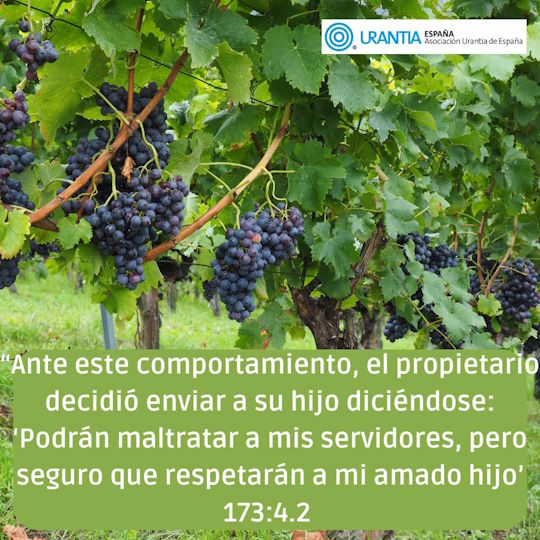
The writer Umberto Eco said that “to survive, one must tell stories.” Jesus of Nazareth went further, because he was not only a brilliant narrator, but he was also attentive to making us reflect on the simple beauty of everyday stories. Can you imagine Jesus now, in our time? He would have known how to tell storytellings and reels with ease, which would have made many people reflect.
In our newsletter “Light and Life” we want to be like our beloved Master every month by telling different “stories” in this space, texts that make us reflect and improve as people. At least, we try. Do you dare to read us?
In the September issue we offer you these four interesting works for your reading:
- Talks (Bill Sadler)
- Brief history of Creation (Eduardo Altuzarra)
- Outline of the seraphic organization (L. Coll)
- Urantian poetry (José Rodríguez Jorge)
We continue with the work on the “Chronicle of the life of Jesus” (paper 158) that helps us in our study of the book, as well as the “Guide to the life of Jesus for the little ones” (Jesus at age 20).
This month we recommend reading an unusual book, The Kiss of God. The Spanish writer Prado Pérez from Madrid surprises us with the description of a real mystical feminine movement that took place in the European Middle Ages. Let yourself be surprised by this text.
This month’s audio refers to “what is expected of us” (“Light and Life” space on Radio Urantia).
Two readers tell us, on the one hand, what their favorite paragraph is (Diego Betancourt) and on the other, Jaime Marco explains to us in a questionnaire his life journey with The Urantia Book.
UBIS courses are resuming, with registration beginning on September 9: https://new.ubis.urantia.org/moodle/
We are also back with the “Urantian talks.” We will begin with the very interesting presentation that Olga López gave in June, at the national meeting in Toledo: “The technological future.” Don’t miss it.
Texts, words, reflections… that can help us see the world with a higher perspective, with a deeper meaning, as Jesus did with his parables. Let’s look at this well-known but inspiring story that Jesus told about a good man:
““There was a good man who was a householder, and he planted a vineyard. He set a hedge about it, dug a pit for the wine press, and built a watchtower for the guards. Then he let this vineyard out to tenants while he went on a long journey into another country. And when the season of the fruits drew near, he sent servants to the tenants to receive his rental. But they took counsel among themselves and refused to give these servants the fruits due their master; instead, they fell upon his servants, beating one, stoning another, and sending the others away empty-handed. And when the householder heard about all this, he sent other and more trusted servants to deal with these wicked tenants, and these they wounded and also treated shamefully. And then the householder sent his favorite servant, his steward, and him they killed. And still, in patience and with forbearance, he dispatched many other servants, but none would they receive. Some they beat, others they killed, and when the householder had been so dealt with, he decided to send his son to deal with these ungrateful tenants, saying to himself, ‘They may mistreat my servants, but they will surely show respect for my beloved son.’ But when these unrepentant and wicked tenants saw the son, they reasoned among themselves: ‘This is the heir; come, let us kill him and then the inheritance will be ours.’ So they laid hold on him, and after casting him out of the vineyard, they killed him. When the lord of that vineyard shall hear how they have rejected and killed his son, what will he do to those ungrateful and wicked tenants?”” (UB 173:4.2)
When those unruly and wicked tenants saw the son, they said to each other, ‘This is the heir. Come on, let us kill him and the inheritance will be ours. ’ So they seized him, threw him out of the vineyard, and killed him. When the owner of this vineyard hears about how they have rejected and killed his son, what will he do with those wicked and ungrateful tenants?
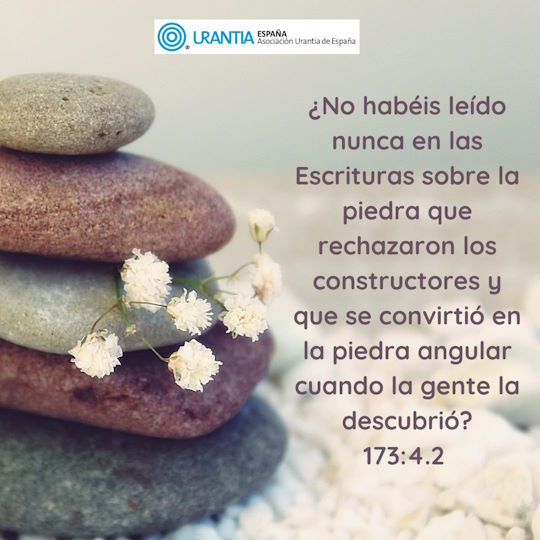
Jesus saw a group of Sadducees and Pharisees making their way through the crowd and he was silent for a moment until they came up to him. Then he said, “You know that your fathers rejected the prophets, and you know that you have decided in your hearts to reject the Son of Man.”
And fixing his gaze on the priests and elders who were near him, he continued: “Have you never read in the Scriptures about the stone that the builders rejected and that became the cornerstone when the people uncovered it? I warn you once again that if you continue to reject this gospel, the kingdom of God will be taken away from you and given to a people eager to receive the good news and produce the fruits of the spirit. There is a mystery in this stone, for whoever falls on it, even if it breaks into pieces, will be saved; but whoever this stone falls on will be turned to dust and its ashes scattered to the four winds. ”
One of the first words that little ones learn is to say “mine, mine.” The inheritance is ours! shout the farmers in this parable, after murdering the servants and the master’s son.
Being lord of the vineyard did not only imply the right to property, but something more subtle such as the “right to command” and, ultimately, also to tyrannize, to impose oneself over others. With this parable we can talk about something as crucial as human rebellion against the fact of having a God above us, the desire to reverse that state of affairs, even at the cost of violence and murder.
But the vineyard can also be Creation, nature in which God no longer counts, because we function without taking Him into consideration: we destroy natural resources and unconsciously devour the goods of the Earth, with the arrogance of someone who believes himself to be the owner and master of everything.
That is: we have become secularized, we have become independent, we are finally autonomous from that invention called God, an invention of childish or feverish minds.
But can we live in the vineyard as if it were really our property? Wouldn’t we be usurping the owner’s property?
The modern world, with its forgetfulness of God, reminds us all too much of this parable of Jesus. By declaring that God is dead or, as is done now, by maintaining that this is something irrelevant or a private matter, the truth is that we ourselves set ourselves up as God, as the absolute criterion. Free at last from Him, after centuries of alienation, we are finally the owners of the earth and we can do with it what we see fit. We are finally the masters! There is no one above us anymore! The vineyard is ours!
And that “stone” that we have despised is the Master. We kill the Son and in doing so we imagine that we have also killed the Father. We are surprised that there can still be a Father waiting for our return after a prodigal life, that his love survives all our murders, which are really suicides.
That precious and discarded stone is the treasure hidden in our hearts. It is surprising that we spend our lives searching for it, having it so close. That we emigrate to other countries, while being in our own. That we live as if we were poor, while being rich.
Something stirs in us every time we hear the news that others have found that stone. We all know those stories: a young woman who opens a book and everything changes for her; another person who listens to some program and life is no longer the same; someone who sat in front of the sea or under a tree as the evening fell and, quite simply, finally saw reality. The spirit found them prepared and the treasure came to light.
And us? Aren’t we also seekers? Don’t we read books, travel, watch YouTube videos in search of that stone of knowledge? Why doesn’t the spirit find us prepared? Do we almost always live outside and far away? What else is there to do?
Let us not lose sight of the fact that Jesus’ parable urges us to also be “farmers” and to cultivate our interiority, where that great treasure that never ends is hidden. This treasure of the spirit, despised by the consumer society, is the cornerstone, the one that will undoubtedly shake the foundations of the current social and economic paradigm.
Consciousness (that interior illuminated by attention) is also the “vineyard” to which God put a fence, built a winepress and raised a tower. God has pampered our soul so much and we, on the other hand, live far away and outside! We kill the messengers of life by settling on the surface of unconsciousness, of the banal.
We now live under the slogans of the neoliberal model that, with its unbridled materialism, increases social inequalities and thus increases human discomfort and unhappiness. Since the eighties, rates of depression, anxiety, addictions and suicide have not stopped growing. In the last decade, cases of depression have increased by almost 20 percent, becoming the biggest cause of disability in the world, according to the WHO.
Margaret Thatcher made it very clear: “economics is the method, the objective is to change the heart and soul.” We must manage to encourage a human being who fights to undertake, to be self-sufficient and productive, without wasting their time in introspection, philosophical speculation. In “cultivating themselves”, in short.
In 2021, Ana Iris Simón, author of the novel Feria, went to the Moncloa Palace to present her ideas at the forum on “Towns with a Future”. Her brief speech had a lot of echo. The young writer admitted that she was envious of the situation of her parents at her age. They, at only twenty-nine years old, already had two children, a car and had embarked on the purchase of their own home. “But above all, they were certain that they could keep their jobs, their children and have their mortgage. And the hope that everything would get better. My parents believed in progress because for them it had been a fact.” Many young people today lack these expectations and instead of children, they look to have a pet. Can we be optimistic about the future? Will things get better? Well, thinking that nothing can change, being pessimistic, predicting a bleak future, does not get us anywhere. And History repeatedly shows us that it is a premise that has no basis. Hope is always our tireless companion. There are many examples that show this to us.
Christianity was a milestone in the history of optimism, as it placed at the center of its message the brotherhood of all human beings and the hope of living in the hands of a wise and loving Father. It publicly exalted values that were unheard of in a warlike and pragmatic Roman Empire. And what began in a tiny way with a handful of men, transformed an entire empire.
The welfare state was a great social achievement. A century before its appearance it seemed like an unrealizable dream, but for decades it has provided goods and services to citizens, and has eradicated health neglect, educational deficiencies and inhuman working conditions.
We now live in a neoliberal model, but no social model is eternal. A change of cycle is always possible and sometimes all it takes is a gesture to start it. When African-American Rosa Parks refused to give up her seat on a Montgomery, Alabama, bus to a young white man, she did not know that her reaction would be a powerful inspiration for the civil rights movement. Her violation of a racist law inspired a historic protest led by a relatively unknown Baptist pastor, Martin Luther King. Let us not lose hope. It is always possible to build a more humane society. Let us be utopian, let us seek to reach the eras of light and life on Earth. Dreams seem unrealizable, but Luther King had a dream and it came true.
Victor Frankl, a survivor of Auschwitz, Dachau and other extermination camps, maintained that everything could be taken away from human beings, except the ability to choose how to face the facts. He did not limit himself to theorizing. His wife, Tilly Grosser, had died in Bergen-Belsen on the day of her liberation. Weakened by hardship, she was crushed by the crowd that rushed to the entrance gate upon discovering the presence of British troops. The human being is not one thing among others, but a rational subject. He does not limit himself to existing, but rather decides. Frankl quotes an aphorism from Nietzsche: “He who has a why to live for, will almost always find a how.” Without a goal or a why, one cannot survive hardship.
Frankl incorporated what he had learned in the Lager into his work as a psychiatrist and created logotherapy, according to which what characterizes the human being is not the search for pleasure (Freud) or power (Nietzsche), but the search for meaning. What is truly human is the ability to think and carry out a project. Meaning appears when we experience a tension towards a noble and rational end: “suffering ceases to be, in a certain way, suffering at the moment in which it finds a meaning, as sacrifice can be.” He denies that the human being is totally conditioned or determined. Circumstances impose limits on us, evil can surround us, but there is always the possibility of transcending or facing problems in a dignified, intelligent and creative way, of finding a meaning greater than the hardships we may be facing in our lives. Many readers of The Urantia Book would agree with his ideas.
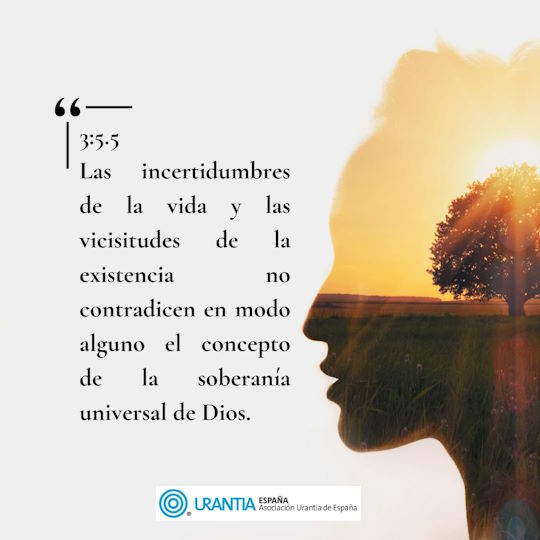
In turn, Frankl would have agreed with the statements we read in the book about the inevitabilities of life on Earth. Let’s refresh that text by remembering some of them:
The uncertainties of life and the vicissitudes of existence do not in any manner contradict the concept of the universal sovereignty of God. All evolutionary creature life is beset by certain inevitabilities. Consider the following: (UB 3:5.5)
Consider the following:
-
Is courage—strength of character—desirable? Then man must be raised in an environment in which it is necessary to deal with difficulties and react to disappointments.
-
Is altruism—service to one’s fellow man—desirable? Then life experience must ensure that situations of social inequality are encountered.
-
Is hope—the greatness of trust—desirable? Then human existence must constantly face recurring insecurities and uncertainties.
Life takes on meaning as we work in the “vineyard” for a greater ideal, building a better world, a fuller and more elevated human being.
The human being who knows the why of his existence will be able to bear almost any how. Our balance is not in a life free of tension, but in the ability to face our limits responsibly and link them to a purpose. Suffering becomes tolerable when it acquires meaning, like when we care for a sick person or when a tolerant, loving and patient Father sends his Son to the vineyard, and receives death at the hands of inconsiderate farmers.
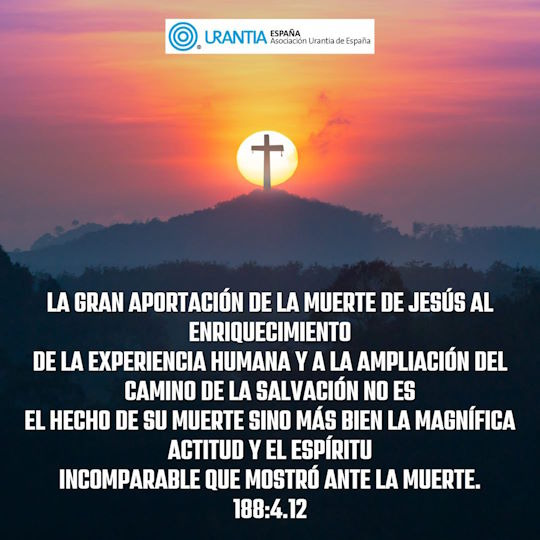
Jesus dies on the cross, and he does so with the serenity and unprecedented love of a life consecrated to an immense project, which encompasses infinite eras and eternal universes.
The great thing about the death of Jesus, as it is related to the enrichment of human experience and the enlargement of the way of salvation, is not the fact of his death but rather the superb manner and the matchless spirit in which he met death. (UB 188:4.12)
The cross forever shows that the attitude of Jesus toward sinners was neither condemnation nor condonation, but rather eternal and loving salvation. Jesus is truly a savior in the sense that his life and death do win men over to goodness and righteous survival. Jesus loves men so much that his love awakens the response of love in the human heart. Love is truly contagious and eternally creative. Jesus’ death on the cross exemplifies a love which is sufficiently strong and divine to forgive sin and swallow up all evil-doing. Jesus disclosed to this world a higher quality of righteousness than justice—mere technical right and wrong. Divine love does not merely forgive wrongs; it absorbs and actually destroys them. The forgiveness of love utterly transcends the forgiveness of mercy. Mercy sets the guilt of evil-doing to one side; but love destroys forever the sin and all weakness resulting therefrom. Jesus brought a new method of living to Urantia. He taught us not to resist evil but to find through him a goodness which effectually destroys evil. The forgiveness of Jesus is not condonation; it is salvation from condemnation. Salvation does not slight wrongs; it makes them right. True love does not compromise nor condone hate; it destroys it. The love of Jesus is never satisfied with mere forgiveness. The Master’s love implies rehabilitation, eternal survival. It is altogether proper to speak of salvation as redemption if you mean this eternal rehabilitation. (UB 188:5.2)
How magnificent was Jesus’ attitude towards life, what a surprising meaning his death had! May we be able to cultivate our minds, to make our vineyard grow, to find the cornerstone on which to build a life full of meaning, just as our Master lived it in an admirable way. Let’s do it, one more day. Let’s be those intelligent and good farmers, capable of transforming the world, of improving the “vineyard”, of doing so by collaborating with our good “master.”
“No more should you fear that God will punish a nation for the sin of an individual; neither will the Father in heaven punish one of his believing children for the sins of a nation, albeit the individual member of any family must often suffer the material consequences of family mistakes and group transgressions. Do you not realize that the hope of a better nation—or a better world—is bound up in the progress and enlightenment of the individual?” (UB 145:2.8)
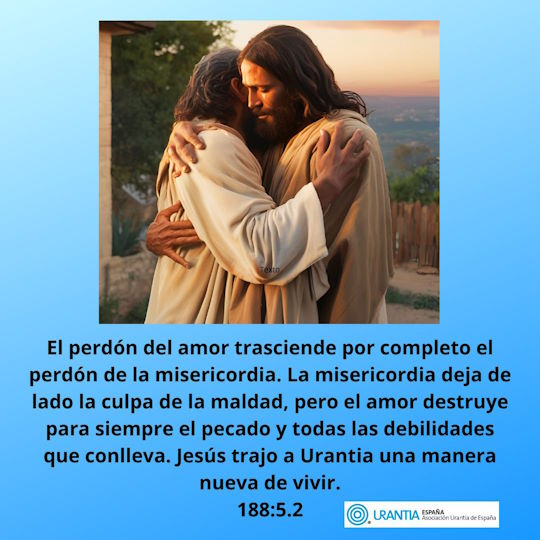
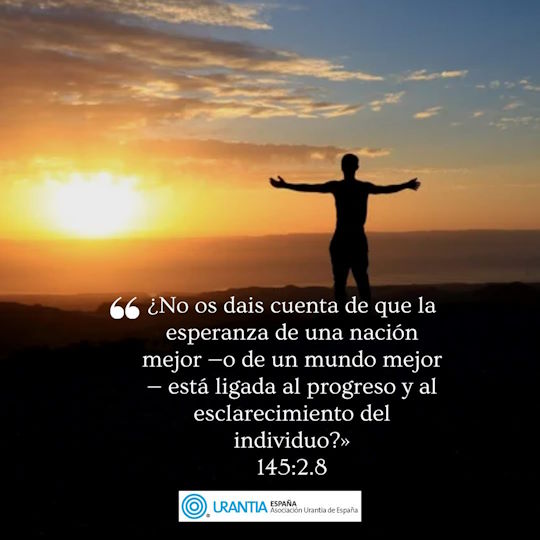
¶ References
- Index of the magazine “Luz y Vida” of the Association of Spain
- This article from the magazine “Luz y Vida Online”
| Luz y Vida — September 2024 — Newsletter | Luz y Vida — September 2024 | Other books on spiritual growth |